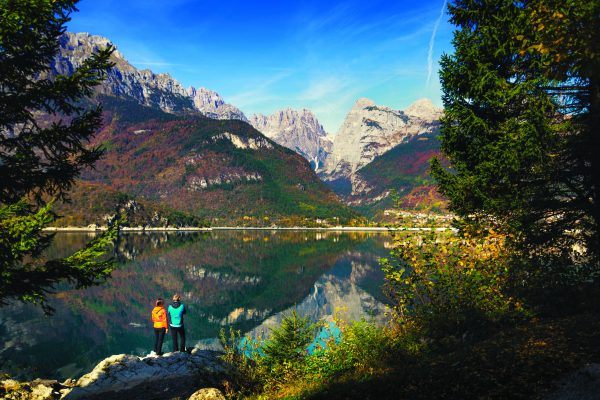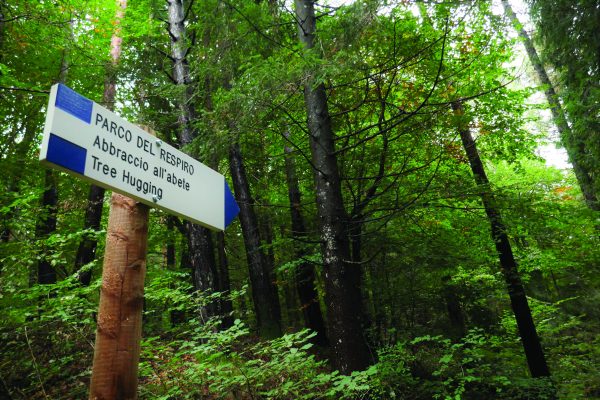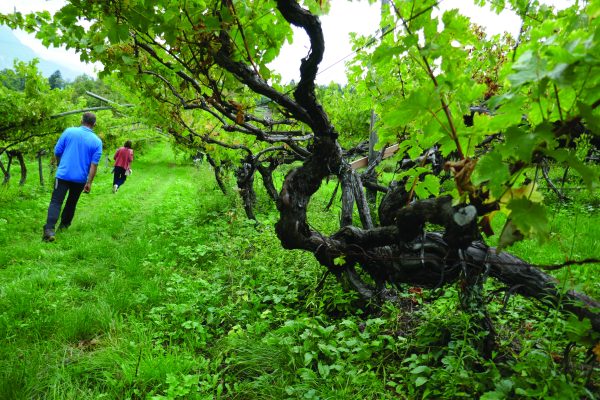Amy McPherson discovers the healing power of nature in the mountains and ancient forests of Trentino

Images by Amy McPherson unless otherwise stated
It has just rained. Soft, dense and moist autumn leaves cushion our steps, and I have the urge to pounce beneath the leafy heaps like a cat, to dig my paws into the fluffy earth, to be covered head to toe in nature. Yanez Borella, whose shadow I have been tailing, picks something off the ground.
“Close your eyes,” he says. “Now tell me what this smells like.”
I tentatively follow his instructions, in the hope that this isn’t a boyish trick, and take a blind sniff at the spongy mass he is holding between his fingers.
“When we lose the sense of our sight, other senses sharpen and make us a lot more imaginative than we normally are,” he softly explained as he waited for me to ponder my answer.
It was a familiar smell, something soothing and homely, it was an aroma of log fires and woolly jumpers, of wooden huts and a cat on my lap, the feeling of the duvet brushing against my body as I sleep.
“It smells like home,” I said, as my final reply.
“Like being at home, like being comfortable, like being safe,” Yanez filled in the gaps.
“There is no English word for it, unfortunately.”
“No, not in Italian either.”
A park to breathe
We are taking a hike in Il Parco del Respiro (The Breathing Park) in Fai della Paganella in Trentino. This is a beech forest dedicated for those who are looking for some quiet breathing space. Designed to give visitors the best possible environment to enjoy the forests, rather than just randomly walking around, there are plenty of areas for lingering in. There’s a couple of trees providing free hugs, for example, and a giant hammock under a cluster of tall beech for lying down in and feeling embraced by the surroundings.
Yanez, an ultra-runner and adventurer, has lived among these mountains and forests for a long time. “It’s no secret: forests heal,” he says, as we slow our pace to stop at one of the vantage points with a sweeping view of the Adige Valley below, where the sun is spotlighting the curve of the Noce and Adige rivers, and the vineyards crawl into the hills opposite.
“It is not surprising to know that children who grew up playing in the forests among the trees all day rarely gets sick compared to children in the cities, even when they grow up.”
There has long been a concept of forest bathing as a wellness practice, as trees are nature’s answer to air filters: they help the generation, protection and sustainability of life. A few hours in the forest is better than taking vitamin supplements, according to the theory that ‘nature heals’.

Nature heals
The original Japanese research into forest bathing identified certain Japanese trees that benefit the human body, and studies have found the same type of substances, called ‘monoterpenes’, in some European species, specifically in larches, red firs, chestnut trees and beech found in mountain forests.
These monoterpenes are aromatic compounds that are released naturally from the trees, and they are said to be able to improve the immune system, lower blood pressure and assist with the natural production of cancer fighting proteins. All nature heals, and these trees heal with super aromatherapy powers.
And the trees and forests here are so important to the people of Trentino that when a night of bad weather destroyed four million cubic metres of trees, the Trentino Tree Agreement was drawn up to protect and restore the remaining and future woodlands.
Other than the occasional whisper of information, Yanez led me through one of the four forest trails in the Breathing Park in silence. Without the distraction of man-induced sounds my ears tuned in to the soft shuffle of branches, the gentle trinkle of a flowing river, the distant flutter of song birds, the tiny scratching of a startled bug crawling under cover and the crunch of our footsteps. It was the healing sound of silence that brought the smile which accompanied us.
Perception walking
Wisdom must come to anyone who lives in the mountains, for the next day of my stay in Trentino I learned the secrets behind the phrase: ‘silence is golden’ from Alissa Shiraishi, who moved to the region for love seven years ago – for the love of her husband, for the love of mountains.
Drawing on wisdoms of forest bathing from her native Japan, Alissa and husband Mattia Cornella run Brentanima, a holistic and wellbeing group with programmes such as yoga and meditation outdoors among the trees, using the natural healing properties of the mountains and the forests.
I joined her for a session of perception walking, where I was deprived of my sight with a blindfold, and Alissa guided me through the surroundings in silence, directing my movements through touch and allowing me to feel my way by placing my hand on various objects around me.
“Our lives are so dependent on our sight and sound that sometimes we cannot appreciate an object without the bias our direct senses place on it,” Alissa explained as she tied the blindfold over my eyes. “When you see something, or hear something, you already make a judgement of what it is, how it should feel or how it should behave, and then we lack the curiosity to really find out for sure that this is how things are; we just make assumptions.”
“When you feel with your hands, you experience that object without bias, through its texture, temperature and moisture. You don’t even need to know what it is; just to appreciate its existence, and understand how it makes you feel.”
For the first few minutes, like everyone else, I was frustrated by the idea that I could not see where I was going and what I was touching. However, with Alissa’s guidance I began to relax, almost meditatively, and started to enjoy the process of discovery, for it is truly an exercise of discovery of new senses and feelings, of the mind bypassing the need to know and simply let something be. If it’s wet, it’s wet. If it’s prickly, it’s prickly. I didn’t need to know what these things were in my hands, except that the sensation of touch made me feel alive.
And the bonus? Learning the art of silence.

Silence
“I think popular culture killed silence,” Alissa says at the end of the session, after we have indulged in a bit of post-walking meditation. “Someone has to be talking; we have to have the radio or the TV on in the background… That’s how we are trained to live our lives: that there must be some sound, some noise. And silence somehow became uncomfortable. Many people don’t realise that when you are surrounded by silence you hear so much more.”
Back in Molveno, a pretty lakeside town wedged between the mountain groups of the Brenta Dolomites and Paganella, I enjoy a relaxing massage at the Dolomia Wellness Centre before retreating to my room at Hotel Londra. The balcony looks out towards the lake and the jagged edges of the mountains – the perfect backdrop to a contemplative glass of the local white. It might be the mountain air, it might be the forests, it might be the influence of those I’ve met on this journey, but I feel rejuvenated and at peace, like I’ve had all the city air squeezed out of me and I’ve planted trees inside my lungs, like I’ve had years of stress and worry just spirited away by these ‘monoterpenes’.
One thing is for sure: there’s definitely something good about the mountains and its forests. Something worth protecting, because if we take care of nature, then nature will take care of us too.
